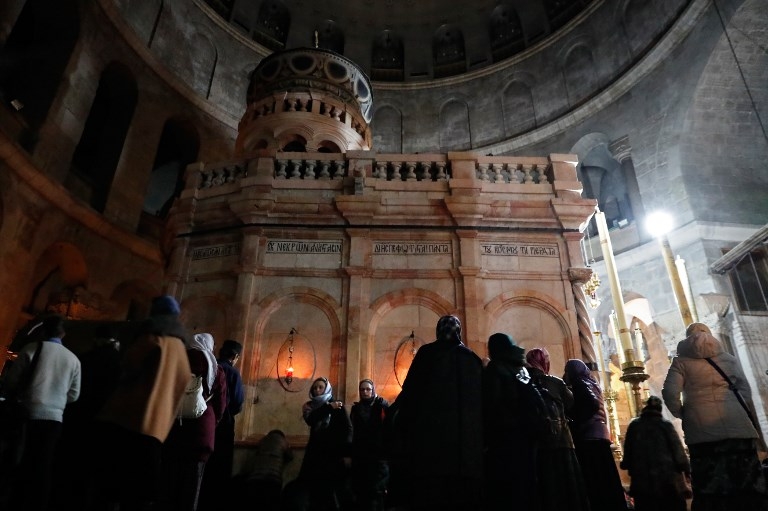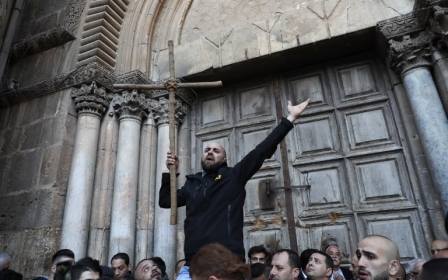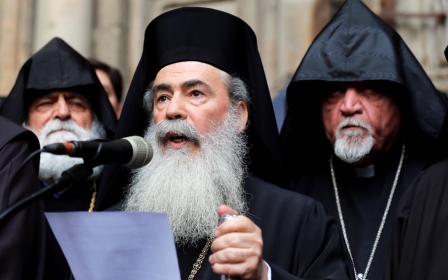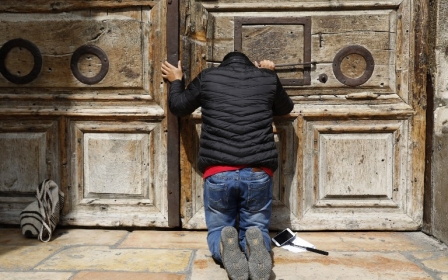Jerusalem's Church of Holy Sepulchre reopens after tax protest

Jerusalem's Church of the Holy Sepulchre, revered as the site of Jesus's crucifixion and burial, reopened on Wednesday after Israel backtracked on Tuesday from a tax plan and draft property legislation that triggered a three-day protest.
The two men who act as keepers of the key of the Church of the Holy Sepulchre opened its large wooden doors at around 4am, ending the protest that began on Sunday at noon.
Shortly afterwards, a group of pilgrims emerged from the still darkened corridors of Jerusalem's Old City to visit the sacred site.
"We prayed in front of the doors every day since Sunday," said Francois-Roch Ferlet, a 29-year-old visiting with a group of 50 people from France, standing near the ornate shrine encasing the traditional site of Jesus's tomb inside the church.
The rare decision on Sunday by church leaders to close the ancient holy site, a favourite among tourists and pilgrims, with the busy Easter holiday approaching put extra pressure on Israel to re-evaluate and suspend the moves.
After receiving a statement from the office of Israeli Prime Minister Benjamin Netanyahu, Roman Catholic, Greek Orthodox and Armenian clergy announced on Tuesday the church would reopen the next morning.
An Israeli committee led by cabinet minister Tzachi Hanegbi will negotiate with church representatives to try to resolve the dispute over plans to tax commercial properties owned by the church in Jerusalem, Netanyahu's statement said.
Church leaders, in a joint statement, welcomed the dialogue.
"After the intervention of the prime minister, the churches look forward to engage with Minister Hanegbi, and with all those who love Jerusalem to ensure that our holy city, where our Christian presence continues to face challenges, remains a place where the three monotheistic faiths (Judaism, Islam and Christianity) may live and thrive together."
The Jerusalem Municipality, Netanyah said, would suspend tax collection actions it had taken in recent weeks.
Mayor Nir Barkat has said the churches owed the city more than $180m in property tax from their commercial holdings, adding that "houses of worship" would remain exempt.
While the review of the tax plan is under way, work on legislation that would allow Israel to expropriate land in Jerusalem that churches have sold to private real estate firms in recent years will also be suspended, Netanyahu said.
The bill's declared aim is to protect homeowners against the possibility private companies will not extend the leases of land on which their residences stand.
Churches are major landowners in Jerusalem. They say such a law would make it harder for them to find buyers for their land sales that help to cover operating costs of their religious institutions.
New MEE newsletter: Jerusalem Dispatch
Sign up to get the latest insights and analysis on Israel-Palestine, alongside Turkey Unpacked and other MEE newsletters
Middle East Eye delivers independent and unrivalled coverage and analysis of the Middle East, North Africa and beyond. To learn more about republishing this content and the associated fees, please fill out this form. More about MEE can be found here.




